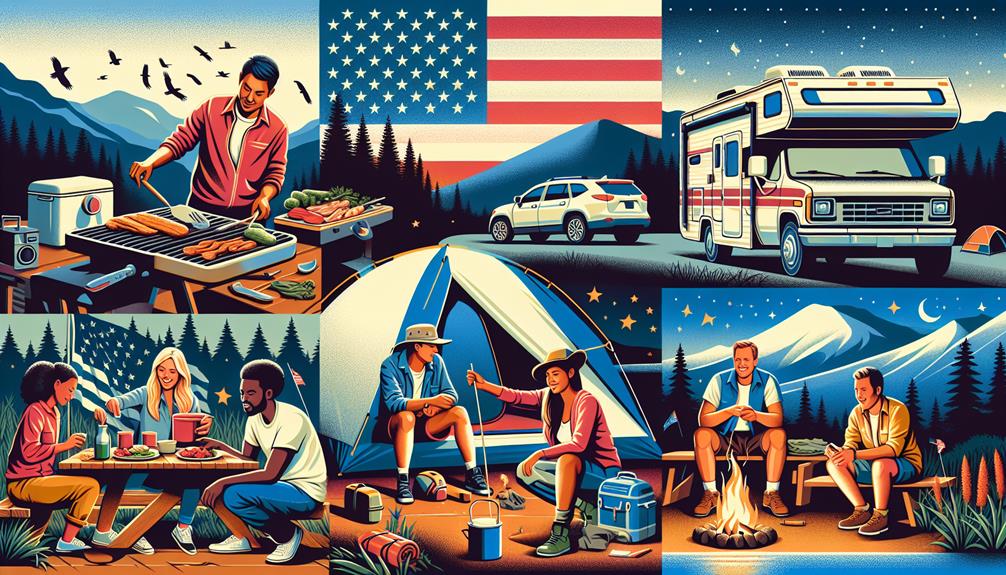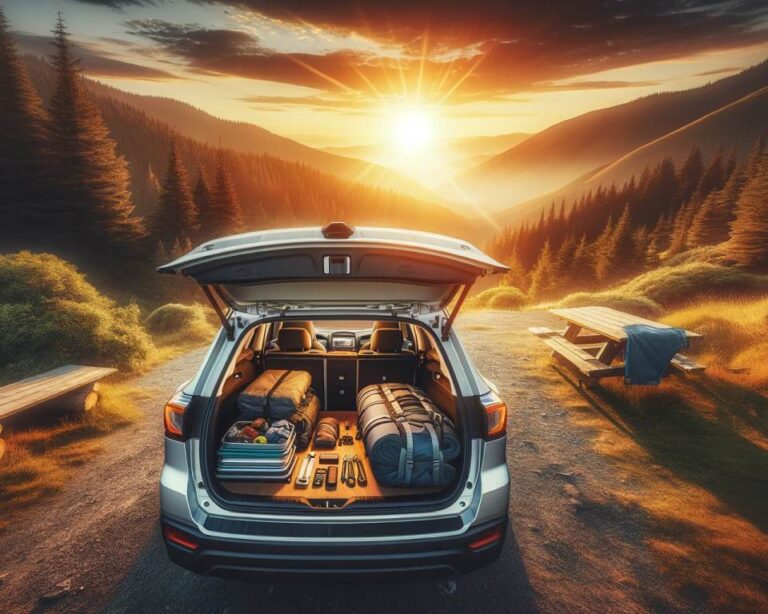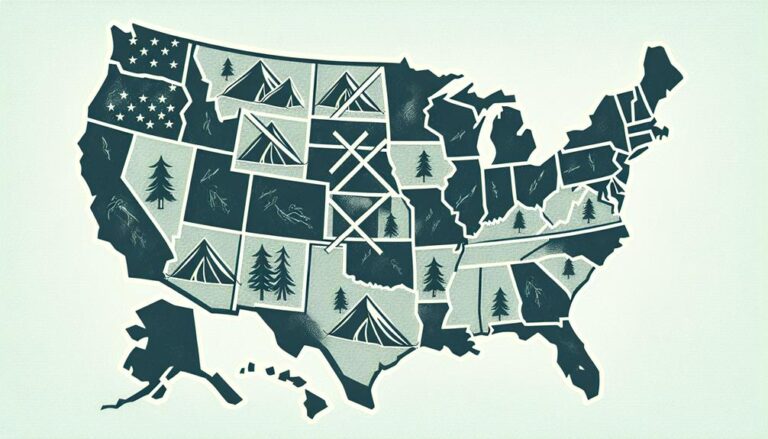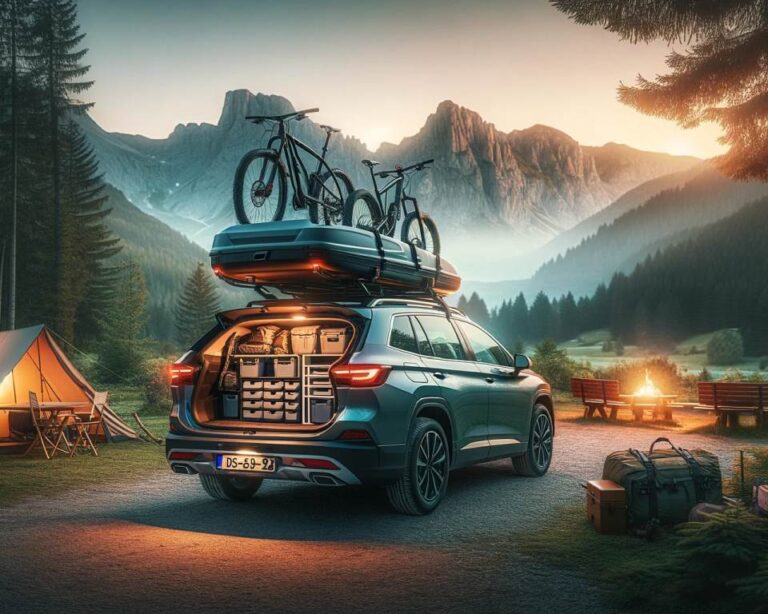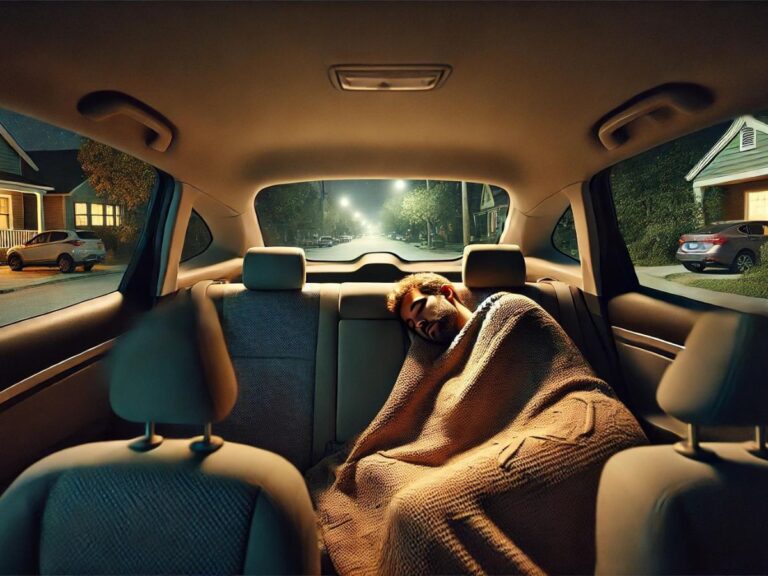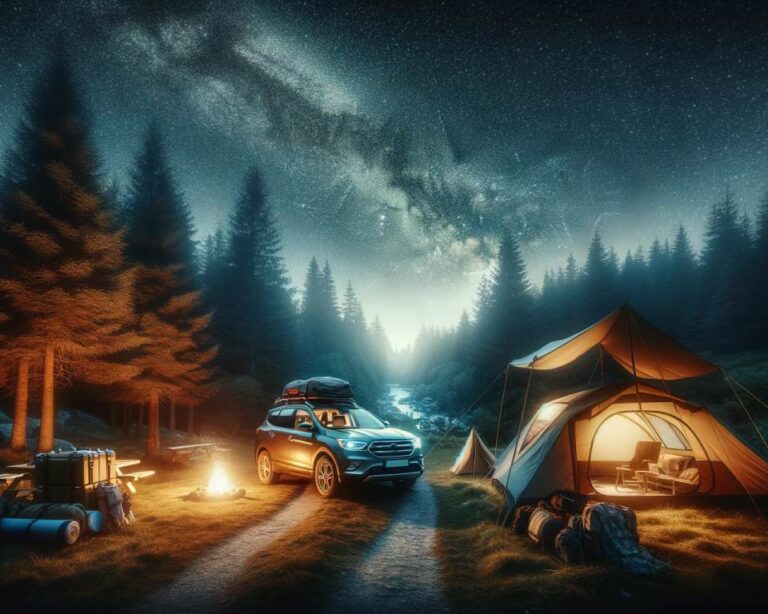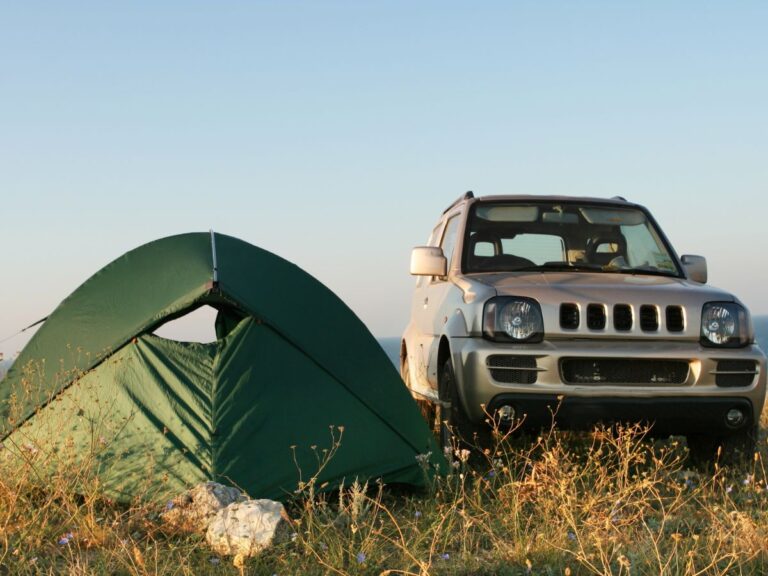Understanding the Key Legal Aspects of Car Camping in the USA
To have a successful car camping trip in the USA, you must grasp the essential legal aspects. State rules on overnight parking differ, so comply to avoid issues. Each location sets limits on how long you can stay – follow them for a hassle-free time. Stick to designated camping spots, obey etiquette, and watch for safety concerns. Know the campfire rules, use designated areas, and be cautious. Proper waste disposal is vital for nature, so follow guidelines to conserve. Familiarize yourself with alcohol and drug laws and wildlife protocols for a trouble-free trip. Further exploration awaits to enhance your understanding.
State Regulations on Overnight Parking
State regulations on overnight parking vary greatly across the United States, impacting where and how individuals can legally car camp within each state. Parking enforcement plays an important role in guaranteeing compliance with these regulations. Local ordinances dictate where overnight parking is allowed, with some states permitting it in designated areas like rest stops or campgrounds, while others strictly prohibit it in public spaces like streets or parking lots. Understanding these local ordinances is essential to avoid fines or having your vehicle towed.
It’s important to research the specific regulations in the state you plan to car camp in to make sure you are parking legally and safely. Some states may require permits for overnight parking, while others have time limits on how long you can park in one location. By familiarizing yourself with the state’s parking regulations and local ordinances, you can enjoy a worry-free car camping experience without the risk of running into legal issues.
Maximum Stay Duration Limits
When car camping, it’s important to be aware of maximum stay duration limits set by different jurisdictions. These restrictions dictate how long you can park and stay in a particular location legally. Understanding these limits will help you avoid any legal issues and guarantee a smooth car camping experience.
Stay Duration Restrictions
There are varying maximum stay duration limits imposed on car camping in different locations across the USA. It is important to adhere to these restrictions to guarantee a safe and enjoyable experience while car camping. Observing campsite etiquette is essential; overstaying your welcome can disrupt the natural flow of the area and inconvenience other campers. By respecting maximum stay durations, you contribute to a harmonious camping environment for all. Safety precautions should also be considered when planning your stay. Staying within the designated time limits can help prevent fatigue and ensure you are well-rested for your journey ahead. Additionally, following these restrictions can aid in avoiding potential conflicts with park rangers or law enforcement. Remember, these limits are in place for a reason, often to protect the environment and ensure fair access for all visitors. By being mindful of stay duration restrictions, you contribute to a positive camping experience for yourself and others.
Legal Parking Locations
Adhere to designated legal parking locations with maximum stay duration limits to guarantee compliance with local regulations and a smooth car camping experience. Ensuring you park in locations that allow overnight stays for the specified duration not only keeps you within the bounds of the law but also contributes to safety measures. By following these restrictions, you reduce the risk of encountering legal issues or facing potential fines for overstaying in a particular area.
Moreover, being mindful of maximum stay limits at legal parking locations is crucial to minimize community impact. Overextended stays in one spot can disrupt the normal flow of traffic, inconvenience local residents, and strain resources in the area. Respecting these restrictions helps maintain a positive relationship between car campers and the communities where they choose to park.
Therefore, always check and adhere to the posted signs or regulations regarding stay duration limits at legal parking locations to ensure a safe and harmonious car camping experience while minimizing any negative impact on the surrounding community.
Permitted Camping Locations
Explore designated campsites within national parks and forests for legal car camping opportunities across the United States. When selecting a permitted camping location, prioritize safety precautions and uphold camping etiquette to guarantee a positive experience for yourself and others. Respecting quiet hours, keeping noise levels to a minimum, and properly disposing of waste are essential camping etiquette practices to follow.
Privacy concerns can arise when camping in designated areas, so be mindful of your surroundings and respectful of other campers’ space. Avoid intruding on neighboring campsites and maintain a reasonable distance to secure everyone’s privacy.
Furthermore, consider the environmental impact of your camping activities. Stay on designated trails, refrain from disturbing wildlife, and properly dispose of trash to help preserve the natural beauty of the camping location for future visitors.
Campfire and Cooking Restrictions
What are the regulations regarding campfires and cooking while car camping in the USA? When it comes to campfire safety and food safety during car camping adventures, it’s essential to adhere to specific guidelines to guarantee a safe and enjoyable experience. Here are some key points to take into account:
- Campfire Safety: Always check for any fire restrictions in the area where you plan to camp. Use designated fire rings or pits if available. Keep a bucket of water and a shovel nearby for extinguishing the fire completely before leaving it unattended.
- Food Safety: When cooking while car camping, ensure that all food is stored properly to prevent attracting wildlife. Use cooking equipment that is suitable for outdoor use and follow proper food handling practices to avoid contamination.
- Open Flames: Be mindful of using open flames near flammable materials such as dry grass or overhanging branches. Keep a safe distance between your cooking setup and any combustible materials to prevent accidents.
Waste Disposal Guidelines
Guarantee proper disposal of waste during your car camping excursions by following designated guidelines and regulations set forth to preserve the environment and maintain cleanliness. Waste management is vital to minimize the environmental impact of your camping trip. Always pack out what you pack in, leaving no trace behind. Separate your waste into categories for recycling options, such as plastics, glass, and paper. Utilize designated recycling bins at campgrounds or dispose of recyclables at recycling centers. Composting guidelines can also be beneficial for organic waste such as food scraps. Consider carrying a small compost bin to collect organic waste and later dispose of it in designated composting areas. By recycling and composting, you not only reduce the amount of waste ending up in landfills but also contribute to the sustainability of your camping environment. Always prioritize waste management to ensure a cleaner and greener camping experience for yourself and future campers.
Noise and Disturbance Policies
Follow campground regulations regarding noise levels and disturbance policies to guarantee a peaceful and respectful camping experience for yourself and other campers. When it comes to noise restrictions and disturbance policies, campgrounds typically have specific rules in place to make sure a harmonious environment for all visitors. Here are three key points to keep in mind:
- Quiet Hours: Most campgrounds have designated quiet hours during which loud noises and disruptive activities should be kept to a minimum. Respect these quiet hours to allow everyone to enjoy a peaceful environment for relaxation and rest.
- Enforcement: Campground staff actively enforce noise restrictions and disturbance policies to uphold a tranquil atmosphere. Failure to comply with these rules may result in warnings, fines, or even expulsion from the campground.
- Consideration: Be thoughtful of your fellow campers by keeping noise levels down, especially during the evening and early morning hours. Remember that everyone is there to unwind and connect with nature, so being mindful of your noise levels contributes to a positive camping experience for all.
Alcohol and Drug Use Laws
When car camping in the USA, it’s important to be aware of the Alcohol Possession Laws, which vary from state to state and can impact your camping experience. Additionally, understanding the Drug Consumption Regulations is vital to avoid legal issues and guarantee a safe trip. Remember that violating these laws can have serious Legal Ramifications, potentially leading to fines, penalties, or even criminal charges.
Alcohol Possession Laws
Understanding the legal regulations regarding alcohol possession while car camping in the USA is essential to guarantee compliance with the law and avoid potential consequences. When it comes to alcohol possession laws during car camping adventures, here are some key points to keep in mind:
- Open Container Laws: Many states have strict open container laws that prohibit the possession of open containers of alcohol in vehicles. It is important to familiarize yourself with the specific laws of the state you are camping in to avoid any legal issues.
- Public Intoxication: Engaging in public intoxication is illegal in most states and can lead to fines, arrest, or other legal consequences. It is vital to consume alcohol responsibly and avoid becoming publicly intoxicated while car camping.
- Designated Driver: If alcohol will be consumed while car camping, always have a designated driver who refrains from drinking to ensure the safety of everyone involved and compliance with the law.
Drug Consumption Regulations
Adhering to the drug consumption regulations, particularly alcohol and drug use laws, is essential for maintaining legal compliance while car camping in the USA. When it comes to drug possession restrictions, it’s important to be aware of the controlled substance laws in each state you plan to visit. Possessing illegal drugs, including marijuana in states where it’s not legalized, can lead to severe legal consequences. Remember that federal law still prohibits marijuana possession, so be cautious even in states where it’s allowed.
Alcohol consumption is also regulated, and open container laws vary by state. In general, it’s illegal to have an open container of alcohol in the passenger area of a vehicle. This applies whether you’re driving, parked, or camping. To avoid any issues, keep alcohol in sealed containers in the trunk or a locked compartment.
Legal Ramifications of Use
Adhering to alcohol and drug use laws while car camping in the USA is essential to avoid facing legal repercussions. Failure to comply can result in serious consequences, impacting your safety and the enjoyment of your trip. Here are three important points to keep in mind:
- Insurance Coverage: Most insurance policies do not cover accidents or incidents that occur while under the influence of alcohol or drugs. If you engage in illegal substance use during your car camping trip and an unfortunate event happens, you may be held liable for any resulting damages or injuries.
- Liability Issues: If you provide alcohol or drugs to minors during car camping or allow them to consume these substances on your watch, you could face severe legal repercussions. It is essential to be aware of the laws surrounding minors and substance use in the specific state you are camping in to avoid being held accountable for any harm caused.
- Legal Ramifications: Violating alcohol and drug laws can lead to fines, criminal charges, and even imprisonment. Being mindful of these laws not only protects you legally but also ensures the safety of yourself and others during your car camping adventure.
Wildlife Interaction Protocols
When encountering wildlife while car camping in the USA, it is important to remain calm and refrain from approaching or feeding the animals. Ensuring wildlife observation from a safe distance is vital for both your safety and the well-being of the animals. Remember to follow safety measures such as keeping food stored properly to prevent attracting wildlife to your campsite.
Feeding wildlife can have severe consequences, disrupting their natural behaviors and potentially leading to aggressive encounters. It is important to understand that feeding wild animals alters their diet and can make them dependent on human food, leading to a loss of their foraging skills and increasing the likelihood of conflicts with humans.
To protect yourself and the wildlife, always respect their space and refrain from feeding them. By following these wildlife interaction protocols, you contribute to maintaining a safe environment for both campers and the animals that inhabit the areas you visit.
Key Legal Aspects for a Successful Car Camping Trip in the USA
In summary, understanding the key legal aspects of car camping in the USA is essential for a successful and enjoyable trip. By familiarizing yourself with state regulations on overnight parking, maximum stay duration limits, permitted camping locations, campfire and cooking restrictions, waste disposal guidelines, noise and disturbance policies, alcohol and drug use laws, and wildlife interaction protocols, you can guarantee a safe and compliant camping experience. Remember to always respect the laws and regulations to protect both yourself and the environment.

